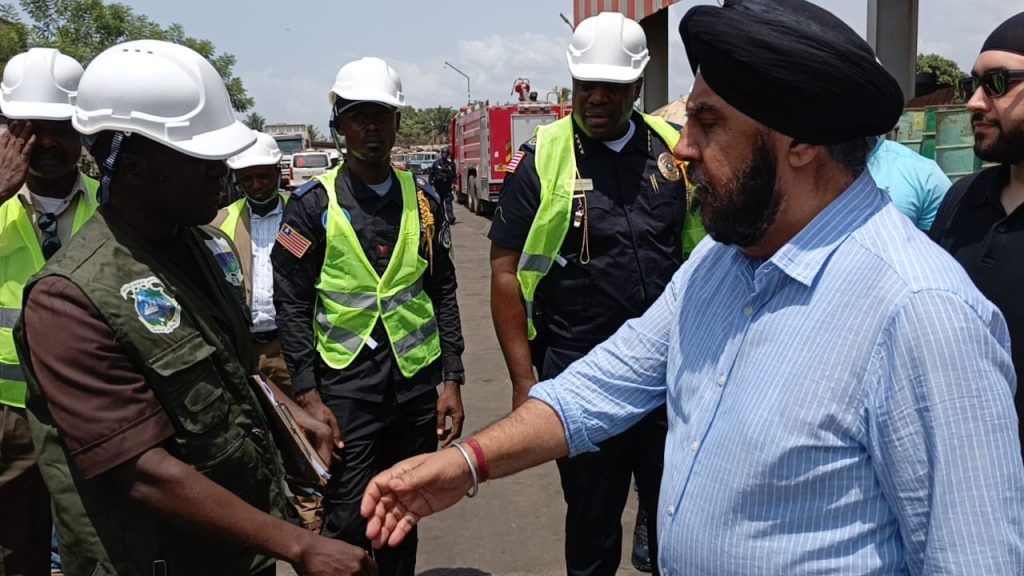The tragic death of Saah Samukai, an employee at Sethi Steel Factory in Liberia, has exposed a shocking disregard for safety regulations and legal compliance within the company and a disturbing lack of oversight by the Liberian government. Samukai’s death, caused by an oxygen explosion at the factory, has revealed that Sethi, a major steel manufacturer holding a monopoly on building materials in the country, has been operating without a license, raising serious questions about how such a blatant violation could go unnoticed for so long. This incident has ignited public outrage and prompted investigations into both the company’s negligence and the government’s failure to enforce existing laws.
The Environmental Protection Agency (EPA), led by Executive Director Dr. Emmanuel Urey Yarkpawolo, has come under fire for its delayed response and apparent ignorance of Sethi’s illegal operations. While the EPA acted swiftly to shut down the factory following the accident, its belated discovery that Sethi lacked a license exposes a significant lapse in regulatory oversight. How could a major industrial operation function for an extended period without the necessary permits, especially under the watch of an agency tasked with environmental protection and public safety? This raises concerns about the EPA’s effectiveness in monitoring industries and enforcing regulations, leaving many wondering how many other companies operate outside the law, endangering lives and potentially harming the environment.
Dr. Yarkpawolo’s claim that the EPA was unaware of Sethi’s illegal status until after the fatal accident is difficult to accept. It strains credulity that a company with such a large footprint and market dominance could escape the EPA’s notice for over a year, especially given the factory’s proximity to Monrovia. This raises questions about the EPA’s internal processes, its commitment to proactive inspections, and the potential for corruption or negligence within the agency. The fact that it took a tragic incident to bring Sethi’s illegal operations to light highlights a systemic failure within the EPA and casts doubt on its capacity to effectively regulate industries and protect public safety.
While the government’s decision to fine Sethi US$5,000 and shut down the factory is a step towards accountability, it is arguably insufficient given the gravity of the situation. A mere fine seems inadequate recompense for the loss of a life and the blatant disregard for safety regulations that led to it. Moreover, the closure of the factory, while necessary for investigation and rectification of safety issues, raises concerns about the potential economic impact, especially considering Sethi’s monopoly on crucial building materials. This highlights the need for a comprehensive review of the licensing and regulatory framework for industries in Liberia, focusing on stricter enforcement, heavier penalties for non-compliance, and proactive monitoring to prevent future tragedies.
The Liberian House of Representatives has taken action by summoning key government officials, including the Ministers of Labor and Commerce, the Bureau of Concessions, the EPA Director, and representatives from Sethi Steel Factory, to address the incident and the broader issues of industrial safety and regulatory compliance. This parliamentary intervention signifies a recognition of the severity of the situation and the need for greater accountability. Rep. Ivar K. Jones’s invocation of Article 8 of the 1986 Constitution, which guarantees safe and humane working conditions, underscores the government’s responsibility to protect its citizens from workplace hazards and ensure that companies operating within Liberia adhere to strict safety standards.
However, the incident reveals a deeper concern about the effectiveness of both the executive and legislative branches in fulfilling their duties to protect the citizenry. The fact that such blatant violations could occur and persist for so long suggests a systemic failure of oversight and enforcement. This raises the possibility that the government’s focus on other priorities may have led to a neglect of its fundamental responsibility to ensure the safety and well-being of its people. The incident serves as a stark reminder of the need for greater vigilance and a commitment to prioritize public safety over other considerations. It also underscores the crucial role of investigative journalism and public pressure in holding both corporations and government agencies accountable for their actions and inactions.














